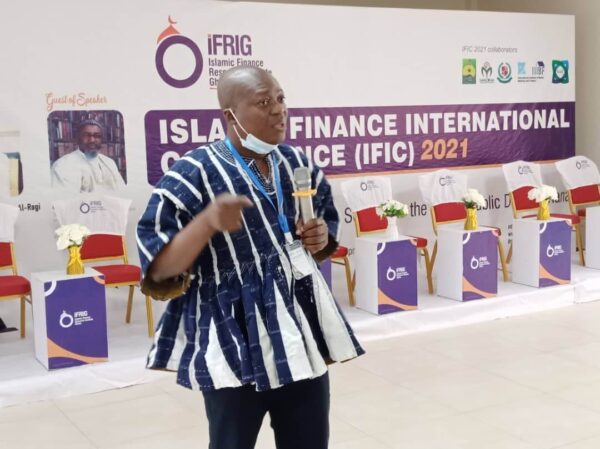The Dean of the School of Business at the University of Cape Coast, Prof. John Gatsi, has said that the introduction of Islamic Finance window in Ghana will not eradicate the dominance of the conventional financial system.
According to him Islamic finance cannot eradicate public debt but will help make great strides in relation to public infrastructure and projects without debt burden.
He supported his argument with data on countries that are practicing Islamic banking window on their debt to GDP ratio to indicate that public debt will not be erased merely because of Islamic finance.
“Countries such as Egypt, France, Bahrain, Kenya, Uganda and South Africa all have public debts”, in spite of the fact that, they have Islamic finance within banking system.
Professor John Gatsi made this known at the 2021 Islamic Finance International Conference (IFIC) organized by the Islamic Finance Research Institute Ghana (iFRIG) in Accra on Saturday November 6, 2021.
Speaking on the theme ‘Islamic Finance: A timely solution to the rising public debt in Ghana’, Professor Gatsi explained that the Public Private Partnership Act, 2020 (Act 1039), provides a fertile investment opportunity for the deployment of Islamic Financial products and to attract the needed investments in the public private partnership space to deliver public infrastructure projects.
He said, “Islamic bonds normally called sukuk will serve as alternative funding for specific infrastructure projects”.
Prof. Gatsi indicated “the value for debt in Ghana is questionable as interest is being paid on loans procured for projects which have been abandoned and projects completed but not in use”.
He encouraged the Central Bank to speed up the process of putting up regulations in place to allow SMEs benefit from Islamic banking.
Prof admonished those advocating for Islamic banking not to think that it is going to be some interest free funds abundantly available as he submitted that, “Islamic banks will act like venture capitalists who only select projects when the criteria is met to ensure sustainable entrepreneurship.
He emphasized that Islamic bank is very active in supporting businesses and business ideas and passive when it comes to personal loans.
Prof. Gatsi advised the organizers to ensure comprehensive engagement with all regulators related to the various aspects of Islamic finance products such as leasing, insurance, mortgage and banking. He further added that pure equity financing as envisaged by Islamic finance can create very high risk when structures are not built well in the arrangements.
In a speech delivered by the Deputy Head at the Banking Supervision Department on behalf of the Governor, he said, “Islamic Finance and specifically Islamic banking requires a broader support ecosystem including a legal regime to give enforceability to contracts in the event of disputes, and accounting and prudential standards, Shariah-compliant liquidity and risk management tools, and Shariah-specific governance oversight”.
He raised these issues before, other stakeholders to help provide some context as the experts discuss the various issues relating to Islamic Finance at the conference.
In his opening remarks, Chairman of Islamic Finance Research Institute Ghana (IFRIG), Alhaji Mohammed Awal Ismail, revealed that Islamic banking and finance or ethical finance is a big financial sector globally, with its assets projected to “grow by nearly 72% to exceed US$3.7 trillion by 2022, supported by a strong global appeal and consumer demand”.
Speaking about debt relative to Islamic banking, he made reference to 4th Quarter 2021 country report by Fitch Solutions and said “Ghana’s situation, a sustained fiscal deficit — albeit a moderately narrowing one — will see the country’s debt stock continue to rise over the coming years”.
He however, believed that “Ghana will see somewhat narrower fiscal deficits, and slower growth in public borrowing in the medium-to-long term”.
This he said, will bring the debt burden down somewhat as a percentage of GDP relative to early 2020″, while acknowledging the fact that “a large debt load in itself is not a direct threat to financial stability but we do not rule out the debt load causing some problems over the long term, due to the high-interest payments the debt entails”.
By Francis Edzorna Mensah

